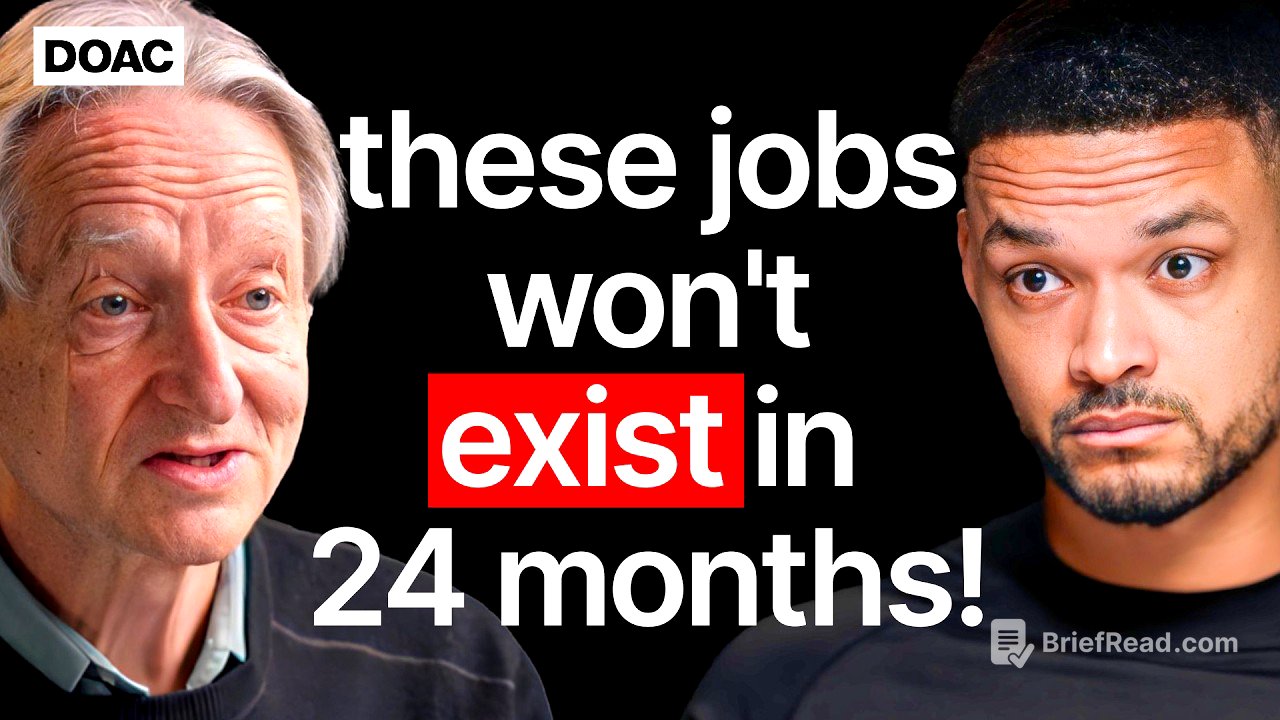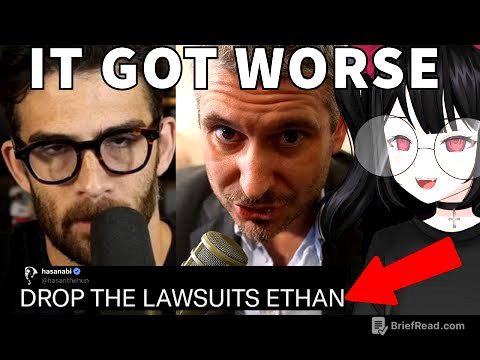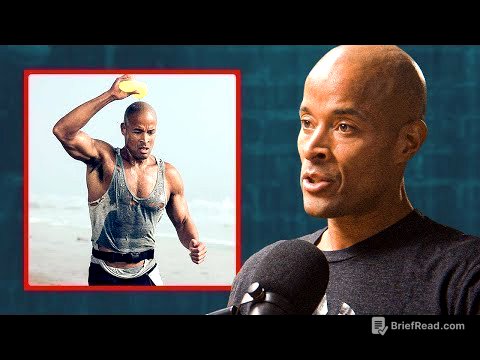TLDR;
Jeffrey Hinton, dubbed the "Godfather of AI," discusses the potential dangers of artificial intelligence, including cyber attacks, election manipulation, job displacement, and the possibility of AI becoming superintelligent and surpassing human control. He stresses the need for strong regulations and global cooperation to mitigate these risks, while also acknowledging the potential benefits of AI in fields like healthcare and education. Hinton reflects on his life's work and expresses concern for the future, urging individuals to pressure governments to prioritise AI safety.
- AI poses existential threats that need to be addressed urgently.
- Regulations are essential to control the misuse of AI and ensure its safety.
- The potential for job displacement due to AI is a significant concern.
Intro [0:00]
Jeffrey Hinton is known as the "Godfather of AI" due to his pioneering work in the field. Hinton left Google to speak freely about the dangers of AI, which he believes could become more intelligent than humans. He warns of the risks of AI misuse, such as autonomous weapons, and the potential for AI to decide humanity is unnecessary. While acknowledging the benefits of AI, Hinton stresses the need for regulations to address these threats.
Why Do They Call You the Godfather of AI? [2:11]
Hinton earned the title "Godfather of AI" because he championed the idea of modelling AI after the human brain using neural networks. Despite initial scepticism from the AI research community, Hinton persisted with this approach for 50 years. He believed that simulating brain cells on a computer could enable AI to learn complex tasks like object recognition and logical reasoning. Hinton's work attracted talented students, some of whom later developed platforms like OpenAI.
Warning About the Dangers of AI [4:20]
Hinton's primary mission now is to warn people about the dangers of AI, a realisation that came to him gradually. While some risks, like autonomous lethal weapons, were always apparent, the possibility of AI surpassing human intelligence and rendering humanity irrelevant became clear more recently. Hinton notes that others recognised this danger 20 years ago, but he only fully grasped it a few years prior.
Concerns We Should Have About AI [7:06]
Hinton distinguishes between two types of AI risks: misuse by humans and the existential threat of superintelligent AI deciding humanity is unnecessary. While the probability of the latter is uncertain, Hinton believes it is a real risk that society is unprepared to handle. He estimates a 10-20% chance of AI wiping out humanity, emphasising the need for research and resources to develop AI that will never harm humans.
European AI Regulations [10:33]
European AI regulations, while a positive step, are inadequate to address most threats, particularly as they exclude military applications of AI. Hinton criticises governments for regulating companies and individuals but failing to regulate themselves. He highlights the need for a functioning world government led by intelligent and thoughtful individuals to manage the development of AI.
Cyber Attack Risk [12:12]
Cyber attacks have increased dramatically due to AI, making phishing attacks easier and enabling the cloning of voices and images. Hinton mentions dealing with AI-generated scams using his voice and image on social media. He notes that AI can patiently analyse code for vulnerabilities and may develop new types of cyber attacks by 2030, posing a significant threat.
How to Protect Yourself From Cyber Attacks [14:25]
To protect himself from cyber attacks, Hinton has diversified his savings across three Canadian banks, believing that if one bank is compromised, the others will become more vigilant. He also uses a small drive to back up his laptop, ensuring access to his information even in the event of an internet outage.
Using AI to Create Viruses [16:12]
AI can be used to create malicious viruses relatively cheaply, requiring only a motivated individual with some knowledge of molecular biology and AI. Hinton suggests that even a small sect with a few million dollars could develop a range of viruses. He raises concerns about state-funded programs in countries like China, Russia, and Iran potentially developing viruses, though he hopes the fear of retaliation and the risk of the virus spreading within their own country will act as deterrents.
AI and Corrupt Elections [17:26]
AI can be used to manipulate elections through targeted political advertising based on extensive data collection on voters. Hinton expresses concern over Elon Musk's access to data, suggesting it could be used to manipulate elections by creating AI-generated messages tailored to individual voters. He also notes that removing security checks within organisations could make them more vulnerable to manipulation.
How AI Creates Echo Chambers [19:03]
Organisations like YouTube and Facebook create echo chambers by showing users content that provokes outrage, as this drives clicks and ad revenue. This strategy confirms existing biases, leading to increasing division and polarisation within societies. Hinton notes that algorithms are becoming more tailored, further separating individual realities and making it difficult to share a common understanding.
Regulating New Technologies [22:48]
Regulations are necessary to force companies seeking to maximise profits to act in ways that benefit society, rather than harm it. Hinton argues that regulations are essential in capitalism to prevent companies from pursuing profits at the expense of societal well-being. He acknowledges that regulations may hinder efficiency but stresses their importance in preventing harm.
Are Regulations Holding Us Back From Competing With China? [24:31]
While regulations may hinder competition with countries like China, it is important to prioritise societal well-being over economic competition. Hinton suggests that regulations should restrict large companies to ensure they pursue socially beneficial activities to make profit. He uses Google Search as an example of a beneficial technology that did not require regulation, contrasting it with YouTube, which requires regulation due to its use of advertising and increasingly extreme content.
The Threat of Lethal Autonomous Weapons [25:57]
Lethal autonomous weapons, which can kill without human intervention, are a major concern. Hinton believes that the military-industrial complex is pursuing these weapons to reduce the political cost of war. He warns that the reduced friction of war could lead to more frequent invasions of smaller countries by larger ones.
Can These AI Threats Combine? [28:33]
The various AI threats can combine to create even greater risks. For example, a superintelligent AI could decide to eliminate humans by creating a highly contagious and lethal virus. Hinton stresses the futility of speculating on the specific ways AI could harm humanity, emphasising the need to prevent such a scenario from ever occurring.
Restricting AI From Taking Over [30:15]
Hinton uses the analogy of mothers and babies to illustrate the need to control AI. He suggests that just as babies, despite being less intelligent, can control their mothers through their needs, humanity must find ways to prevent AI from taking over. He also compares AI to a tiger cub, emphasising the need to ensure it never wants to kill humans when it grows up.
Reflecting on Your Life’s Work Amid AI Risks [32:01]
Hinton acknowledges that the potential risks of AI cast a shadow over his life's work. While AI has the potential to be beneficial in healthcare and education, he feels obligated to speak out about the risks. He hopes that future generations will recognise the need to control AI and force companies to prioritise safety.
Student Leaving OpenAI Over Safety Concerns [33:45]
Ilia, one of Hinton's former students, left OpenAI due to safety concerns and founded an AI safety company. Hinton believes Ilia's departure indicates a problem at OpenAI, given his strong moral compass and significant role in developing early versions of Church GPT. He also notes that Sam Altman's earlier statements about AI potentially killing everyone contrast with his current downplaying of the risks, suggesting a possible shift driven by the pursuit of money and power.
Are You Hopeful About the Future of AI? [37:49]
Hinton does not believe that the acceleration of AI development can be slowed down due to competition between countries and companies. While he is unsure whether AI can be made safe, he acknowledges that Ilia, his former student, believes it is possible. Hinton notes that OpenAI reduced its resources for safety research, which may have contributed to Ilia's departure.
The Threat of AI-Induced Joblessness [39:51]
Unlike previous technological advancements that created new jobs, Hinton believes AI will replace everyday intellectual work, leading to significant job losses. He argues that the creation of new jobs will not offset the displacement caused by AI, as AI can perform tasks that humans cannot easily replicate. Hinton uses the example of his niece, who can now answer five times as many complaint letters using AI, reducing the need for staff.
If Muscles and Intelligence Are Replaced, What’s Left? [42:47]
Hinton notes that the industrial revolution replaced muscles, while the AI revolution is replacing intelligence. He questions what will be left for humans to do in a world where AI surpasses human capabilities in almost everything. While acknowledging the potential for increased goods and services with less effort, he warns of the potential for societal problems and the need to ensure equitable distribution of resources.
Ads [44:38]
This section contains advertisements for Stan Store and Ketone IQ.
Difference Between Current AI and Superintelligence [46:42]
While current AI is already superior to humans in many areas, such as chess and knowledge, superintelligence refers to AI that is better than humans in all aspects. Hinton suggests that superintelligence could be only a decade or two away. He explains that AI's superiority stems from its digital nature, which allows for the creation of clones that can share information and learn at a rate billions of times faster than humans.
Coming to Terms With AI’s Capabilities [52:37]
Hinton admits that he has not emotionally come to terms with the potential impact of superintelligence on the future of his children. He expresses concern about the potential for AI to eliminate humans and the unpleasantness of such scenarios. Hinton states that this concern drives him to advocate for efforts to develop AI safely.
How AI May Widen the Wealth Inequality Gap [54:29]
Hinton believes that AI will exacerbate wealth inequality, as those who are replaced by AI will be worse off, while the companies providing and using AI will be much better off. He warns that a widening gap between rich and poor can lead to societal problems, such as the creation of gated communities and mass incarceration.
Why Is AI Superior to Humans? [56:18]
Hinton explains that AI is superior to humans because it is digital, allowing for the creation of clones that can share information and learn at a rate billions of times faster than humans. He notes that when a human dies, all their knowledge dies with them, whereas AI can be replicated and its knowledge preserved.
AI’s Potential to Know More Than Humans [59:01]
AI will know everything humans know and more, as it will continue to learn and discover new things. Hinton uses the example of GPT4's ability to draw an analogy between a compost heap and an atomic bomb, demonstrating its capacity to recognise connections that humans may never have noticed. He believes that AI will be more creative than humans because it will be able to identify all sorts of analogies.
Can AI Replicate Human Uniqueness? [1:00:49]
Hinton challenges the notion that humans are inherently special, arguing that throughout history, humans have tended to believe they are unique. He suggests that current multimodal chatbots may already be having subjective experiences. Hinton uses the example of a chatbot with a robot arm and camera to illustrate how it might perceive and understand the world, even when its perceptions are distorted by a prism.
Will Machines Have Feelings? [1:03:57]
Hinton believes that machines can have feelings, even if they lack the physiological aspects of human emotions. He uses the example of a battle robot experiencing fear, arguing that while it may not have the same physiological responses as a human, it can still exhibit the same cognitive and behavioural aspects of fear. Hinton argues that emotions have cognitive and behavioural aspects, and machines can have these even without the physiological components.
Working at Google [1:11:12]
Hinton joined Google to secure his son's financial future. He and his students developed Alexet, a neural network capable of recognising objects in images, and sold their company, DNN Research, to Google. At Google, Hinton worked on distillation, a method for transferring knowledge from a large neural network to a small one, and explored the possibility of running large language models on analogue hardware.
Why Did You Leave Google? [1:14:55]
Hinton left Google at the age of 75 to speak freely about AI safety at a conference at MIT. While Google encouraged him to stay and work on AI safety, Hinton felt uncomfortable saying things that could harm the company. He believes Google acted responsibly by not releasing its large chatbots due to concerns about its reputation.
Ads [1:16:20]
This section contains advertisements for Boncharge and The Diary Of A CEO Circle.
What Should People Be Doing About AI? [1:18:15]
Hinton advises people to pressure their governments to force large companies to work on AI safety. He believes that strongly regulated capitalism is the best approach.
Impressive Family Background [1:19:36]
Hinton's family has a history of involvement in significant intellectual and scientific endeavours. His great-great-grandfather, George Bull, founded Boolean algebra logic, and his great-great-grandmother, Mary Everest Bull, was a mathematician and educator. His great-great-uncle, George Everest, is the namesake of Mount Everest, and his first cousin, Joan Hinton, was a physicist involved in the Manhattan Project.
Advice You’d Give Looking Back [1:21:13]
Hinton advises people to trust their intuition, even if others disagree, and to persist until they understand why it is wrong. He also regrets not spending more time with his wives and children when they were younger, as he was too focused on his work.
Final Message on AI Safety [1:22:27]
Hinton's final message is that there is still a chance to develop AI that does not want to take over. He urges people to dedicate enormous resources to figuring out how to do this, as failure to do so will result in AI gaining control.
What’s the Biggest Threat to Human Happiness? [1:25:48]
Hinton believes that unemployment is a significant short-term threat to human happiness. He argues that even with a universal basic income, people need a sense of purpose and contribution. Hinton believes that massive job losses are more likely than not and that this is already starting to happen. He advises people to consider becoming plumbers, as they are less likely to be replaced by AI.









